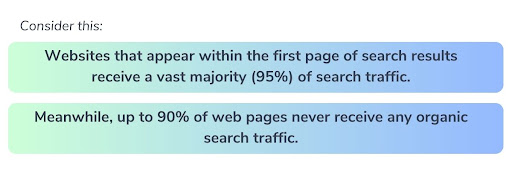What Is an SEO Plan and Why Is it Needed?
June 12, 2023 •Josh Daugherty

For modern businesses, crafting an effective SEO strategy can simultaneously feel like a daunting, stressful task and an exciting opportunity to increase brand awareness and engage with prospects. Yet, few marketers will tell you it’s irrelevant or not worth the investment—if they do, they’re frankly misinformed.
Despite what some say, SEO is not dead—rather, it’s “alive and kicking.” But some of the search engine optimization techniques that worked in the past can now have detrimental effects. Why? Frankly, it’s because search engines are getting smarter.
So, as you’re reading this today, how can you get in the action or level-up your SEO prowess? How could a well-designed and successfully implemented 6-month SEO plan take your marketing to the next level? Keep reading for these answers and more in our brief overview of SEO plans.
Does SEO Still Work in 2023?
Most definitely! Especially when it’s done well, SEO can be the difference between publishing content that gets no traction and attracting high-quality prospects to your brand. Just think about how often we all turn to Google for answers and insights, and then consider these statistics:

Sources: Digital Synopsis, Ahrefs
The simple, straightforward, spin-free truth is that SEO matters, and developing an effective SEO plan is the best way to ensure your content gets traffic.
Why Are People Afraid of SEO?
In most cases, people who “fear” SEO simply misunderstand SEO. This could be because it’s a new concept, or it could be that they’ve heard conflicting things about it and simply don’t know who or what to believe. Here are a few potential reasons why SEO can seem a little scary to some marketers:
- They might be intimidated by search engine algorithms. As it turns out, though, Google wants the same thing your prospective customers want: helpful content that’s written clearly and organized well. If you’re wondering “how does SEO work on Google?” you can take a deep dive into their SEO Starter Guide.
- They might think it’s unproven. The truth is that SEO can be difficult to measure, especially if you’re not really knowledgeable about which KPIs matter most or are new to the game. That doesn’t mean it doesn’t work, though—it just means you need to be precise in your objective-setting and you need to identify and track the right metrics.
- They might not know where to start. Even though the term “SEO” has been around since 1997, it’s also been almost constantly debated in the years since. What the experts consider best practices one day can sometimes be rendered obsolete almost overnight.

What Should Be Included in an SEO Plan?
Here are the six must-have elements of an effective SEO plan:
- Meaningful Goals and Relevant KPIs | Without a clear and meaningful objective in mind, SEO can feel like an endless process of trial-and-error. It also becomes exceptionally difficult to measure whether your SEO plan is working or not. Marketing departments have limited budgets, so setting a clear goal also helps to ensure that resources are being used in the best way(s) possible.
- Clearly Defined Roles and Responsibilities | Even the most impressive plans fall apart without accountability and collaboration. Who will decide what topics to cover and what kind of tone to use? Who will do the actual writing? Who is going to be responsible for publishing and promoting it?
- An Understanding of Your Target Audience | One of the most common reasons why some companies’ SEO plans fail to move the needle is that they’re not really aligned with what their actual customers (or prospects) are looking for. Using keyword research tools like DemandJump can help you zero in on the right content to write.
- Well-Written Content | This is important because, well, SEO is all about content! When it comes to improving SEO, the best content is clear, well-organized, and credible. First and foremost, though, it should help answer the most important questions—full stop.
- Publishing and Promotion | While content itself gets a lot of attention when discussing SEO, that content goes nowhere without promotion. At DemandJump, we specialize in Pillar-Based Marketing (PBM), which focuses on creating an informative network of interlinked content. Use actionable calls to action (CTAs) in each piece of content to nudge interested customers toward signing up for an email newsletter, scheduling a demo, or some other clear action.
- Measuring and Improving | As you track your SEO plan’s objectives and KPIs over time, you’ll be able to really hone in on what works and what doesn’t. If the metrics say your content is performing well, that’s great—keep your foot on the gas! Keep promoting your content, and consider engaging with prospects via social media. If it’s not doing so well, you may need to revisit your objectives, rethink how you’re writing about the topics, or give it a little more time (SEO isn’t an instant solution, it takes time).
What might these components look like when you put them together? Consider this 6-month SEO action plan template for developing content as an example:
- Month 1 | Perform a site audit and analysis, to assess the current state of your website and content.
- Month 2 | Do keyword research to understand what types of questions your prospective customers are asking.
- Month 3 | Write and publish a network of informative and engaging content. We recommend using a PBM strategy to help ensure that your content gets real traction.
- Month 4 | Leverage on-page SEO techniques—like using high-value keywords in headings, optimizing images, and addressing page load speeds—to refine and amplify your content.
- Month 5 | Use off-page SEO techniques—like guest blogging and backlinking, or engaging with social media—to refine and amplify your content even further
- Month 6 | Measure the results, take inventory of lessons learned, and look for opportunities to keep moving the SEO needle.
How Do I Start an SEO Plan?
If you’re ready to hit the ground running with SEO, here are a few steps you can take today to begin developing an SEO plan for your content strategy:
- Decide what you want to accomplish, and set appropriate and measurable goals. Do you simply want to increase brand awareness, or do you have more specific objectives in mind, like inspiring readers to sign up for product demos?
- Develop an understanding of your prospective customers’ search behavior. This is where DemandJump’s platform can help you demystify search behavior. Our platform is packed with keyword research and content strategy tools that can help you understand the search landscape, your competitive opportunities, and know exactly what to write about.
- Outline a content plan. For the best results, keyword research should be paired with a content strategy like PBM. If you’re just hearing about PBM for the first time, we highly recommend familiarizing yourself with it. Through DemandJump University, you can even get certified as a PBM writer or strategist.
From there, you’re ready for the fun stuff: writing, publishing, and promoting your content!
DemandJump + SEO: Name a More Iconic Duo (We’ll Wait)
DemandJump provides content marketers and strategists with a dynamic toolset for driving SEO results. From intuitive keyword research and content planning tools to competitive insights, results tracking, and more, it’s all there. Why not take it for a spin? Key SEO insights could just be a click or two away. Did we mention it’s free to try?
Featured Articles
Categories
- Attribution Tracking (13)
- Channel Optimization (11)
- Consumer Insights (68)
- Content Marketing (251)
- Data Science (8)
- Digital Marketing (6)
- Digital Transformation (26)
- Enterprise (10)
- Lead Generation (14)
- Market Intelligence (8)
- Marketing Analytics (39)
- Marketing Attribution (57)
- Marketing Management (153)
- Marketing Operations (86)
- Organic Search (222)
- Paid Search (52)
- Pillar-Based Marketing (63)
- Programmatic Advertising (9)
- SaaS Content (14)
- SaaS Marketing (29)
- Search Marketing (111)
- SEO Keyword Research (28)
- SEO Pillar (18)
- SEO Strategy (46)
- SMB (5)
- Website Content (12)


